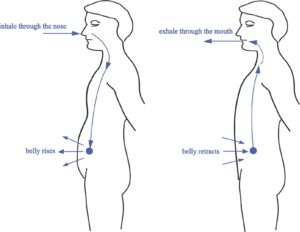Coping with Stress – Don't forget to breathe
Abdominal Breathing
Your breathing directly reflects the level of tension you carry in your body. Under tension, your breathing usually becomes shallow and rapid, and occurs high in the chest. While relaxed, you breathe more fully, more deeply, and from your abdomen. Its difficult to be tense and breath from your abdomen at the same time.

Some of the benefits of abdominal breathing include:
- Increased oxygen supply to the brain and muscles.
- Stimulation of the parasympathetic nervous system. This branch of your autonomic nervous system promotes a state of calmness. It works in a way that is exactly opposite to the sympathetic branch of your nervous system (the fight or flight response) which stimulates a state of emotional arousal and the very physiological reactions underlying a panic attack.
- Greater feelings of connection between the mind and body. Anxiety and worry tend to keep you "up in your head". A few minutes of deep abdominal breathing will help bring you down into your whole body.
- More efficient excretion of bodily toxins. Many toxic substances in the body are excreted through the lungs.
- Improved concentration. If your mind is racing, its difficult to focus your attention. Abdominal breathing will help quiet your mind.
- Abdominal breathing by itself can trigger a relaxation response.
Abdominal Breathing Exercise
Note the level of tension you're feeling. Then place one hand on your abdomen right beneath the rib cage.
Inhale slowly and deeply through you nose into the bottom of your lungs. If your breathing from your abdomen, your rib cage should actually rise. Your chest should move only slightly while your abdomen expands. In abdominal breathing, the diaphragm — the muscle that separates the lung cavity from the abdominal cavity — moves downward. In doing so it causes the muscles surrounding the abdominal cavity to push outward.
When you've taken a full breath, pause for a moment and then exhale slowly. Be sure to exhale fully. As you exhale allow your whole body to let go. Imagine your arms and legs going limp like a rag doll.
Do ten slow, full abdominal breaths. Try to keep your breathing smooth and regular. It will help to count to four on the inhale and then slowly count to four on the exhale.
Try to do 10 sets of 10 breaths. If this is difficult for you at first, begin with less and work your way up. Five full minutes of abdominal breathing will have a pronounced effect in reducing anxiety, or feelings of panic.



